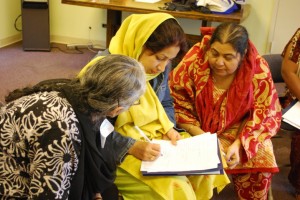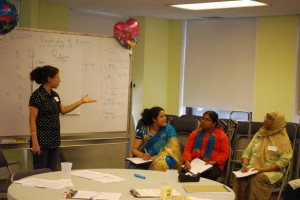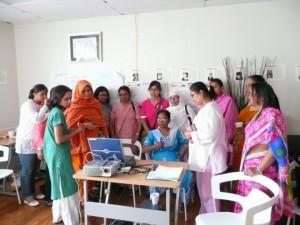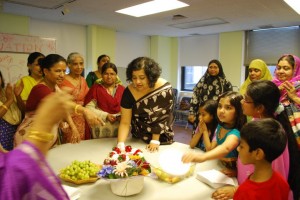* transforming communities from within
Transforming Communities from Within: Shakti Peer Groups Journey to End
Which of the following statements are true?:
- One in every three women in the world has experienced sexual, physical, emotional or other abuse in her lifetime
- Domestic violence is primarily a crime against women. In 2003 in the United States, women accounted for 85% of the victims of intimate partner violence and men accounted for approximately 15%
- Women of all races are about equally vulnerable to violence by an intimate partner
- Domestic violence includes physical, emotional, financial, sexual and spiritual abuse
- Domestic violence can occur in relationships regardless of sexual orientation, age, economic and educational status.
If you answered “All”, you are correct. Yes, the statistics are chilling. Violence against women is a global phenomenon transcending race, class, gender, sexual orientation and education status. It occurs within all communities, and we South Asians are not immune to it, despite the silence and shame that many of us suffer due to cultural and social stigma.
We are lucky that within the past 25 years there have been many organizations around the U.S that have arisen to assist survivors of domestic violence in the South Asian community. Organizations such as Sakhi for South Asian Women in New York, Manavi in New Jersey, Raksha in Atlanta and many others have excellent programs to support women and their families who are in need of shelter, legal advice, immigration advice, and emotional support. These organizations offer services to women and children in our communities in a culturally sensitive manner and create safe spaces for women to heal.
After graduating from college with a degree in Sociology and Women’s studies I was a volunteer at Manavi teaching ESL to women accessing their services, and landed my first job at Sakhi where I got to interact with survivors of violence at all stages: from doing intakes, helping them get referrals to services, and offering support at the monthly support group meetings. I also got to interact with the other wonderful volunteers who would accompany women to their court appointments, help with translation for women, and help them re-enter the job market.
 After several years of working in violence against women organizations in immigrant communities, I realized that there was a gap in terms of the way that services were being offered in our communities. There is definitely a need for organizations to offer services to those in immediate need. However, in order to bring about a change in our communities, it is also important to reach out to those who are ‘lay’ community members; our khalas and our pishis and our mamas and our brothers to acknowledge that violence does exist in our families and our communities, and that as a community we need to come up with collective solutions to violence against women and children. I also realized that there is not just ‘one’ response to violence against women in our communities, and it was an issue that needed to be discussed and addressed on an ongoing basis and not just in situations when women were in immediate danger.
After several years of working in violence against women organizations in immigrant communities, I realized that there was a gap in terms of the way that services were being offered in our communities. There is definitely a need for organizations to offer services to those in immediate need. However, in order to bring about a change in our communities, it is also important to reach out to those who are ‘lay’ community members; our khalas and our pishis and our mamas and our brothers to acknowledge that violence does exist in our families and our communities, and that as a community we need to come up with collective solutions to violence against women and children. I also realized that there is not just ‘one’ response to violence against women in our communities, and it was an issue that needed to be discussed and addressed on an ongoing basis and not just in situations when women were in immediate danger.
 In 2007, I trained a group of 9 South Asian women in New York City to become peer educators on violence against women through a program at CONNECT’s Community Empowerment Program. These women ranged in ages from their early 20’s to their late 50’s, they were all immigrant women, and many worked as domestic workers, teachers, translators and home-makers. There were women in the group who were themselves survivors of domestic violence. This group went through an intensive 40 hour, culturally specific training on violence against women in South Asian communities, and the tools to go and outreach about it in their own particular communities as ‘peer educators’. The peer educators ended up collectively performing over 300 hours of outreach within a 2 month period to neighborhoods in New York City in Queens, Brooklyn and the Bronx to mosques, businesses, schools, and community events.
In 2007, I trained a group of 9 South Asian women in New York City to become peer educators on violence against women through a program at CONNECT’s Community Empowerment Program. These women ranged in ages from their early 20’s to their late 50’s, they were all immigrant women, and many worked as domestic workers, teachers, translators and home-makers. There were women in the group who were themselves survivors of domestic violence. This group went through an intensive 40 hour, culturally specific training on violence against women in South Asian communities, and the tools to go and outreach about it in their own particular communities as ‘peer educators’. The peer educators ended up collectively performing over 300 hours of outreach within a 2 month period to neighborhoods in New York City in Queens, Brooklyn and the Bronx to mosques, businesses, schools, and community events.

Since most of the peers spoke Bengali, they mainly outreached to the areas inhabited by large Bangladeshi populations such as Jamaica Queens, Parkchester in the Bronx, Jackson Heights and more. The outreach and education strategies employed by the peer educators was not just directed towards women, but also to engage men as allies in the movement to end violence against women.
Through this process, the change in the peer educators themselves was remarkable. For some of the women, it was the first time that they took the subways by themselves, for others the group was a sources of support, and they all grew in self-confidence and in their commitment to end violence in our communities.
In 2008 we formed the Shakti Peer Group, whose goal is to to end violence against women through training, education and outreach. Since our inception our original group of peer educators have trained 20 other women to become peer educators on domestic violence in our community. The Shakti Peer Group has conducted multiple trainings and outreached to over one thousand community members using creative methods such as small group sessions over chai and samosas, speaking to community members in public spaces, and holding informative workshops on domestic violence, gender roles and provided culturally specific resources for women in need. Our members have spoken at various local and national conferences on our unique strategy to combat violence against women through a peer education approach.
We are very excited to be invited again by Adhunika to do a workshop on October 22, 2011 from 4pm-6pm at 37-43 77th St. 2nd floor, Jackson Heights, NY 111372 (Chhaya CDC Office). Shakti Peer Group members Mahmbooba Akhtar Kabita and Sharmin A. Quraishi will be conducting the workshop. We look forward to working together to make our families and communities a safe space for all, and finding a collective solution to end violence against women.
~ Krittika Ghosh
For more information on the Shakti Peer Group please email at shaktipeers@gmail.com
Krittika Ghosh is the co-founder of the Shakti Peer Group. Ms. Ghosh has a long history of working for social justice causes in the immigrant communities in New York City including domestic violence, workers rights, immigration and public health. Ms. Ghosh is currently based in Toronto where she is working on microcredit and health education for women in developing countries. Ms. Ghosh holds a MSc in Gender Studies from the London School of Economics and Political Science.

